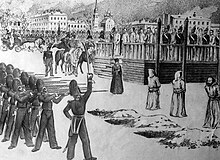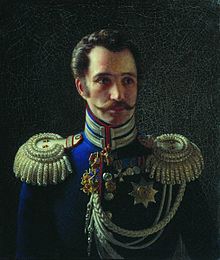Leonti Wassiljewitsch Dubelt
Leonti Vasilyevich Dubelt ( Russian Леонтий Васильевич Дубельт Leonty Vasil'evič Dubel't ; * 1792 ; † 9. May 1862 in Saint Petersburg ) was a Russian statesman, General of Cavalry and I. Nicholas 1835-1856 Chief of the Security Police gendarme corps and 1839 –1856 chief of the secret police .
Life
Leonti, son of the hussar Wassili Ivanovich Dubelt and his wife Maria Grigoryevna Schperter, was trained at the Petersburg Mining Academy from 1801 to the beginning of 1807 and then joined the Pleskau infantry regiment as an ensign . During the Fourth Coalition War at the headquarters in Guttstadt , deployed in Wolfsdorf and Deppen, he became a lieutenant at the end of 1807 . During the Patriotic War he stood near Smolensk , was wounded near Borodino , fought near Tarutino and Malojaroslavz and took part in the Sixth Coalition War. He served as an adjutant to Dmitri Dochturow and Nikolai Rajewski and received the order Pour le Mérite in 1814 . From 1816 staff officer at the headquarters near Rajewski in Kiev , he became a lieutenant colonel on September 15, 1817 and from 1821 commanded the Saslavl infantry regiment.
In 1822, after the Freemasons were banned in Russia, Leonti Dubelt admitted membership of lodges in Hamburg ("Emanuel zur Maienblume"), Saint Petersburg (" Astreia "), Kiev ("United Slavs") and Białystok ("Golden Ring") in writing . After December 14, 1825 suspected of ties to the Decembrists - he was at least known to Sergei Volkonsky and Michail Orlov - he was exonerated in 1826 by the investigative committee.
After differences with his division commander Pyotr Scheltuchin, Leonti Dubelt resigned from military service on December 29, 1828 and settled in Ryskino in the Tver Governorate on the estate of his wife Anna Nikolayevna. On February 1, 1830, Dubelt became a staff officer in the Tver Gendarme Corps . A relative of his wife had spoken to Alexander von Benckendorff for Dubelt. In 1830 Dubelt was made a colonel , knighted on October 3, 1831, and on July 1, 1835 as major general in the gendarme corps .
From April 1, 1838 to December 5, 1844, Leonti Dubelt belonged to the Imperial Suite and became Lieutenant General . From March 1839 to August 1856 he excelled as head of the secret police in the areas of censorship , persecution of the Raskolniki and tracking down political secret societies. For example, he arranged for the surveillance of Pushkin , Nekrasov and the Slavophiles .
Some of the proceedings in which Dubelt personally participated:

- 1834 prohibition of the encyclopedic journal Moscow Telegraf ,
- 1836 Ban on the Moscow literary magazine Teleskop ,
- 1837 Examination of the posthumous writings of Alexander Pushkin,
- 1837–1838 Lermontov was transferred to the Caucasus for his poem The Death of the Poet ,
- 1847 Trial of Nikolai Kostomarow , Taras Shevchenko and others from the Cyril and Method Brotherhood ,
- 1848 Mikhail Saltykow-Shchedrin was transferred from Petersburg to Vyatka (until 1855) for free-thinking writings ,
- 1848–1849 trial of the Petraschewzen (including Dostojewski ),
- March 1849 six-day arrest of the Pan-Slavist Ivan Aksakov ,
- 1851 Prince Sergei Wassiljewitsch Trubezkois imprisoned for the affair of Lawinija Schadimirowskaja,
- 1852 Ivan Turgenev was arrested and exiled for two years on his Spasskoye-Lutovinovo estate because of an obituary for Gogol .
From 1852 to 1856 Dubelt was Deputy Minister of the Interior. On the occasion of his accession to the throne, Alexander II appointed the henchman as general of the cavalry on August 26, 1856.
Leonti Dubelt found his final resting place in the Smolensk cemetery in Petersburg next to his wife Anna Nikolajewna.
family
Dubelt married Anna Nikolajewna Perskoi (1800-1853) in 1818, the niece of Admiral Nikolai Mordwinow . The couple had two sons - Nikolai (1819–1874) and Michail (1822–1900). Both made it to the rank of lieutenant general. Michail was married to Alexander Pushkin's daughter Natalja (1836–1913) from 1853 to 1863.
Honors
- December 3, 1807: Order of St. Vladimir 4th class
- 1812: Russian Order of Saint Anne 4th class
- February 5, 1814: Russian Order of Saint Anne 2nd class
- 1830: Russian Order of Saint George 4th class
- 1832: Order of St. Vladimir 3rd class
- 1834: Decoration for 25 years of loyal service
- March 26, 1839: Order of St. Stanislaus
- August 22, 1840: Decoration of honor for 30 years of loyal service
- April 16, 1841: Russian Order of Saint Anne 1st class with imperial crown on April 11, 1843
- April 7, 1846: Order of St. Vladimir 2nd class
- April 11, 1848: Imperial-Royal Order of the White Eagle
- 1849: golden snuffbox set with diamonds with the portrait of His Majesty
- 1850: Alexander Nevsky Order with diamonds in 1852
- 1850: Decoration of honor for 40 years of loyal service
Trivia
For most Petersburg residents, Leonti Dubelt is said to have come across as a bogeyman.
Web links
annotation
- ↑ Dubelt's direct superior intelligence officers, the Supreme Chiefs of the Third Department , were Alexander von Benckendorff and, from 1845, Alexei Orlow .
Individual evidence
- ↑ idiots at genwiki.genealogy.
- ↑ Russian Лавиния Жадимировская, see for example Russian Prince Sergei Trubezkoi and Lawinija Schadimirowskaja
| personal data | |
|---|---|
| SURNAME | Dubelt, Leonti Wassiljewitsch |
| ALTERNATIVE NAMES | Дубельт, Леонтий Васильевич (Russian); Dubel't, Leontij Vasil'evič |
| BRIEF DESCRIPTION | Russian statesman, general of the cavalry, chief of the gendarmerie corps and chief of the secret police |
| DATE OF BIRTH | 1792 |
| DATE OF DEATH | May 9, 1862 |
| Place of death | St. Petersburg |




